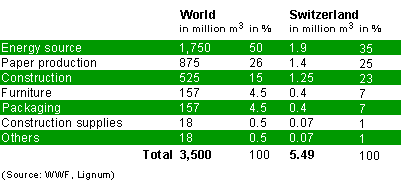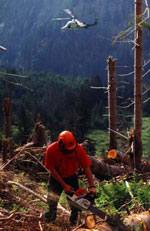|
|
Wood,
the most important resource for 40% of the world’s population
Wood
is the primary source of energy for 40 per cent of the world’s
population; in underdeveloped areas it is often the only source
of energy there is. This is all too often forgotten by the developed
world. In terms of quantity, this demand accounts for around half
of all the wood harvested worldwide. Of the remainder, around one
half is used for the construction industry and related areas (such
as carpentry, furniture, do-it yourself markets) and the other for
the paper industry.
Yearly
production of timber and its use in 1996:

However,
the significance of the world’s forests lies not only in the
wood they contain but , equally important, in their vital function
as natural biotopes, atmospheric purifiers, source of drinking water
and habitats for a huge variety of natural species. These ecological
qualities are becoming even more highly valued in the world’s
industrialized regions. And yet the facts of the matter offer a
strong contrast to these ecologically minded attitudes. Today, less
than 1 per cent of the total forested area of Western Europe is
natural forest, and the only extensive are of primeval forest in
Europe, in the Russian republic of Komi, is under immediate threat
of destruction by the timber industry – from the industrialized
nations, of course.
The
”State of the World’s Forest 2001” report by the
FAO lists the forest’s uses as the most important once:
| •
|
Non-wood
forest products
|
| •
|
Soil
and water conservation
|
| •
|
Biological
diversity conservation
|
| •
|
Mitigation
of climate change
|
| •
|
Support
to agricultural systems
|
| •
|
Provision
of recreational opportunities
|
| •
|
Protection
of natural and cultural heritage
|

Copyright
picture: Rotex
 |
Top |
|
|

|


